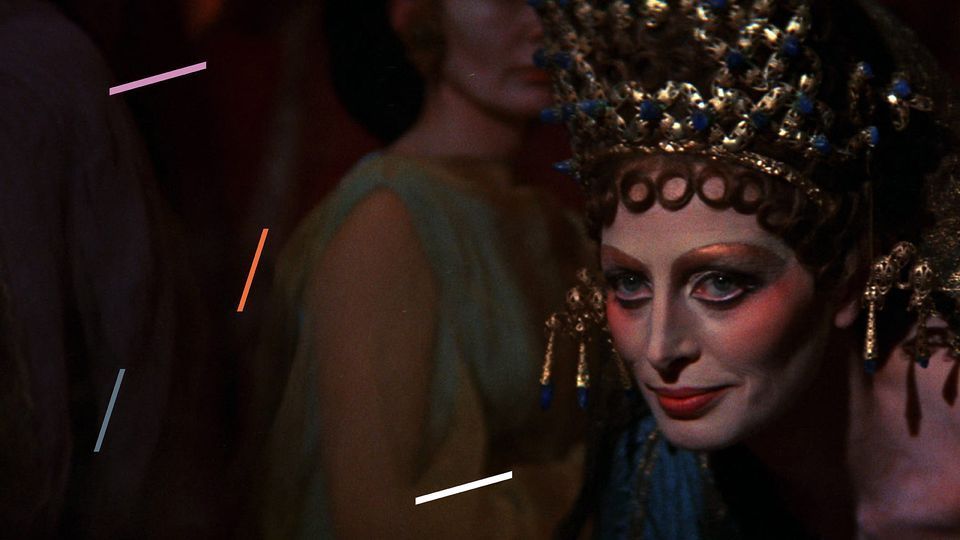
Advertisement
Hogy mi is Fellini Satyriconja? Fogas kérdés. A rendező egyszer úgy határozta meg, hogy sci-fi, amely a múltban játszódik. A film alapja Petronius Arbiter, a Néró idején élt költő hasonló című, de csak töredékeiben fennmaradt regénye, amely korának gyilkos szatírája volt. Fellini epizódok laza sorává szerkesztette a töredékeket és egyfajta odisszeát, utazó regényt épített belőlük. De azt már jól tudjuk, hogy a jövőbe/múltba tett utazások az igazi művész kalauzolásával a jelent tárják fel és nagyon is aktuális kérdéseket tesznek fel.A Satyricon látványtobzódás. Fellini Bosch és Bruegel nyomdokain halad. Szóval senki ne keresse benne az idillt. Brutális. Óva intjük a cizellált lelkű nézőket. itt az antik Róma a brutalitás, a perverzió, a véres pogány szertartások pszichedelikus tablója. Ez esetben még csak morális kiüresedésről sem beszélhetünk, hiszen a mindent átjáró erkölcstelenség az alapközege ennek a világnak. Minden és mindenki eladó, babonák, hitszegés, a hatalom féktelen birtoklása… Rémes. Mintha Richard von Krafft-Ebing Psychopathia Sexualis című művének illusztrációiba lépnénk be. Fellini korának Petroniusa lenne? Így is szemlélhetjük, hiszen Fellini életművének nagyon erőteljes a társadalomkritikus vonala. És ezen belül is hangsúlyos a múlthoz való viszony. Az, ahogyan a mindenkori hatalom átszínezi a múltat, hogy felhasználja saját céljaira. Filmjeiben ezzel rendszerint szemben áll a személyes emlékezés, amely pontatlan, olykor álomszerű, de emberi. A Satyricon szobrai, freskói, falfirkái azok a fragmentumok, amelyek ránk maradtak, s amelyek birtokában megpróbáljuk rekonstruálni a múltat. De érdemes-e belekapaszkodnunk ebbe a múltba? Majd a következő alkalommal a Fellini - Róma (1972) próbál választ adni erre a megválaszolhatatlan kérdésre.
Olasz nyelven, magyar felirattal.
A vetítést megelőző és az azt követő beszélgetés magyar nyelven zajlik.
//
What is Fellini's Satyricon, exactly? A tricky question. The director once defined it a sci-fi set in the past. The film is based on the fragments of a novel written by the poet Petronius Arbiter, who lived in the times of Emperor Nero and whose book was the greatest satire of the age. Through a loose series of episodes, Fellini edits the pieces of the book to construct a kind of odyssey, a travel novel. Though as we well know, these journeys into the future/past, guided by the true artist, will explore the present and raise extremely topical questions.
Satyricon is an abundance of spectacle. Fellini follows in the footsteps of Bosch and Bruegel. In other words, don't come here looking for a safe haven. It is brutal. We warn spectators of a delicate disposition: here, ancient Rome is a psychedelic smorgasbord of brutality, perversion and bloody pagan rites. In this case, we cannot even speak of moral emptiness, since all-pervading immorality is the basic medium of this world. Everything and everyone is for sale, the property of superstition, perfidy and unconstrained power... Terrifying. As though you are stepping into the illustrations of Richard von Krafft-Ebing's work Psychopathia Sexualis. Would Fellini be the Petronius of his era? You could certainly argue the case, given the importance of the socially critical thread running through Fellini's work. And within that, the relationship to the past is also emphasised. The way power always repaints the past in order to use it for its own ends. In Fellini's films, this idea is usually contrasted with personal memories, which are inaccurate, sometimes dreamlike, but human. Satyricon's statues, frescoes and graffiti are those fragments that remain with us and in our possession as we attempt to reconstruct the past. But is the past worth hanging on to? In his next film, Fellini - Roma (1972), the director attempts to answer that unanswerable question.
In Italian, with Hungarian subtitles.
The discussions before and after the screening are conducted in Hungarian.
///
A Müpa social media házirendje:
https://www.mupa.hu/kozossegi-mediafeluleteinkre-vonatkozo-szabalyok
https://www.mupa.hu/en/social-media-policies
Advertisement
Event Venue & Nearby Stays
Müpa Budapest, Komor Marcell utca 1., Budapest, Hungary
Tickets
